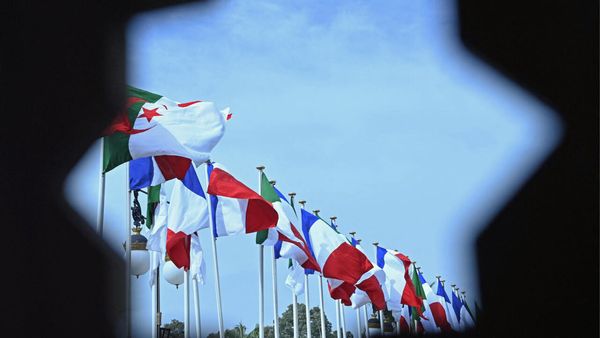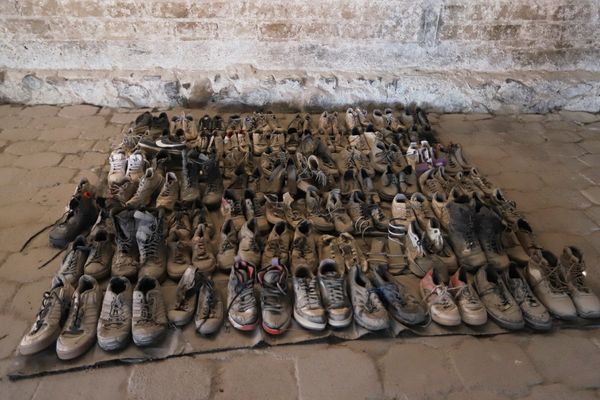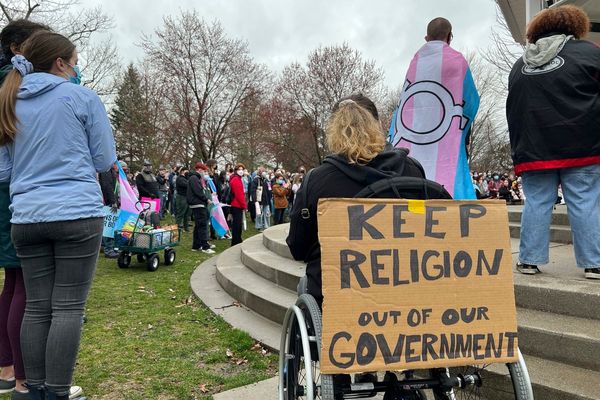
After first the Israeli government and then the United States government issued statements Wednesday, with supporting evidence, that the deadly rocket exploding into the Al-Ahli Arab Hospital parking lot in Gaza on Tuesday did not emanate from Israel, Jordanian Foreign Minister Ayman Safadi gave an expected if telling response.
"Nobody is buying that narrative in this part of the world," Safadi told NBC. Safadi's predecessor (and also Jordan's former ambassador to Israel), Marwan Muasher, echoed that in an interview with CNN: "The Arab public puts the attack squarely on Israel."
As generalized descriptions of Jordanian public sentiment, these declarations are doubtlessly true, if on the absolutist side. Public opinion research prior to the Hamas massacre and kidnapping of Israeli non-combatants October 7 showed a population primed to disbelieve claims from its western neighbor, particularly when it comes to the plight of repressed Palestinians.
A March-April Washington Institute survey of 1,000 randomly selected Jordanian citizens showed that 84 percent opposed doing business with Israeli companies, 76 percent think Jordan should refuse Israeli humanitarian aid even during a natural catastrophe, and a distressing 60 percent had positive views about Hamas firing rockets into Israel. A June-December 2022 poll by the Arab Center for Research and Policy Studies put opposition to diplomatic recognition of Israel at an overwhelming 94 percent. And an April 2022 poll by the Center for Strategic Studies found a national plurality of 45 percent, and a supermajority of 87 percent among a subset described as "experts," agreeing with the statement that the greatest regional source of security threats was—note the language—"the presence of Israel."
So Jordanian predispositions partly explain why the country has been rocked by massive and occasionally violent street demonstrations since the hospital bombing. But those protests have also been fueled by the Jordanian government, whose King Abdullah II called the explosion "a heinous war crime that cannot be ignored," declared three days of national mourning, then cancelled a planned meeting with President Joe Biden.
Abdullah is no mere regal ornament. "The king plays a dominant role in politics and governance," the nonprofit global rankings outfit Freedom House concluded in its 2023 report, declaring Jordan "not free" and ranking it at 145th for freedom in the world. (The United States was 59th, Israel 74th; both were deemed "free.") "The media and civil society groups are hampered by restrictive laws and government pressure," the group noted. "Various statutes penalize defamation, criticism of the king or state institutions, harming Jordan's relations with foreign states, blasphemy, and any content considered to lack objectivity."
Reporters Without Borders puts Jordan 146th in its 2023 World Press Freedom Index (the U.S. is 45th, Israel 97th); the 2023 Global Expression Report has the kingdom at 115th, in the "highly restricted" category, with the U.S. 21st ("open") and Israel 49th ("less restricted"). It is reasonable to infer that Jordanian public opinion is under the measurable influence of its monarchical government. Which, like the also repressive regimes of nearby Egypt, Syria, Lebanon, Iraq, and Turkey, has not let new information dislodge initial certitude in blaming Israel for a calamity that is thankfully diminishing in lethality by the minute.
"The only way that people would entertain a different narrative," Jordanian Foreign Minister Safadi told NBC, "is if there is an independent international inquiry into the tragedy that has happened with impeccable evidence that it was not Israel."
Focus for a moment not on Safadi's understandable if currently unfulfillable desire for an independent international inquiry (such inquests being rather hard to pull off when the host government is holding more than 200 people hostage), but rather on the words only, entertain, and impeccable. It is considered to be a reasonable default position that all Muslims in the region believe the hospital bombing was Israeli "genocide" (as labeled by Hamas), a "hideous war crime" (Palestinian Authority President Mahmoud Abbas), or "the latest example of Israel [being] devoid of the most basic human values" (President Recep Tayyip Erdogan of NATO member Turkey). Only an unattainable standard of evidence could begin to pry open minds currently snapped shut; until then, let those embassies burn.
The Israelis, with some level of detail, say that their bombs leave much bigger craters than the divot in the parking lot, that video evidence shows a Gaza-fired rocket that exploded and went sideways, that the damage is consistent with how Hamas rockets damage Israeli targets, that there is no physical evidence of Israeli munitions on the scene, that they have no record of firing anything in that time/place, and that they have intercepted Hamas audio from Gaza discussing the misfire in real time. The best case against Israel's hospital claims ("about as good as it gets," says the disgraced NBC "disinformation" hunter Ben Collins) comes down to saying that the audio sounds fake, some of the information was contradictory, and that the Israelis have lied in the past. The exculpatory evidence on the Gaza side is far less impressive.
But as can be observed every day in less consequential political discourse, we just don't believe you is among the most potent of overrides when it comes to assessing factual claims. Those who assign Israelis, and their American sponsors, with central blame for the conflicts in the Middle East, end up treating the accused as guilty until proven innocent. "Israel…is the least trustworthy source about the bombing of the hospital in Gaza," asserted the subhed on a Wednesday Scheer Post column from former New York Times Mideast correspondent Chris Hedges that repeated several Hamas-generated claims that have since been debunked.
For a more sober presentation of a similar sentiment, here's Beirut journalist (and Reason contributor) Michael Young, writing Thursday at Carnegie Mellon's Diwan:
Israel has insisted that the hospital attack was the result of a malfunctioning Islamic Jihad rocket. Yet without a neutral investigation, why should anyone believe the Israelis? They lied about the Qana massacre in April 1996 in Lebanon, saying the bombing of a United Nations base was a mistake, before a UN investigation contradicted this assessment. Similarly, the Israelis lied about the killing of journalist Shireen Abou Aqleh in May 2022. After first blaming Palestinians, the Israelis later concluded there was a "high possibility" she had been "accidentally" hit by Israeli gunfire directed at Palestinian gunmen. However, investigations by several media outlets, including CNN, the New York Times, the Washington Post, the Associated Press, in addition to Bellingcat and a UN-mandated body, refuted key aspects of the Israeli narrative.
Even assuming that the Gaza hospital was hit mistakenly by a Palestinian rocket, publics on both sides are so polarized today that no one is really interested in the truth. In other words, Israel has caused enough victims, and committed enough war crimes (as has Hamas) in its current military campaign, that many people both in the region and internationally have limited patience for permitting an open-ended invasion of Gaza that causes more carnage among the civilian population.
Note the fatalism in the second paragraph. It's a grim situation indeed if "no one is really interested in the truth." Which is why we need to insist on it—from our news organizations, from our governments, from ourselves.
If Israel fired the rocket that hit the hospital, or fired the rocket that knocked the Gazan rocket off course and toward the hospital, and then went to such extraordinary lengths to cover it up and lie about it to an American president making an unprecedented visit during wartime, then the consequences for bilateral relations and military support should be grave. If, on the other hand, Gazans fired the rocket, lied about it, and wildly exaggerated the death toll, then not only do news organizations need to engage in a series of corrections and professional self-inventory, but the leaders of surrounding states should retract their own accusations, both to the world community and to their own beleaguered populations.
That such potential mea culpas in any direction are unlikely do not make them less aspirational. We will all personally do better as news consumers and sharers if we demand rigor for ourselves. Expecting the same from others, including those who disagree with us, is an essential pre-condition for treating them with respect, instead of like children who can't handle the truth.
The post Who Is—and Isn't—Ready To Change Their Minds About the Gaza Hospital Blast? appeared first on Reason.com.







